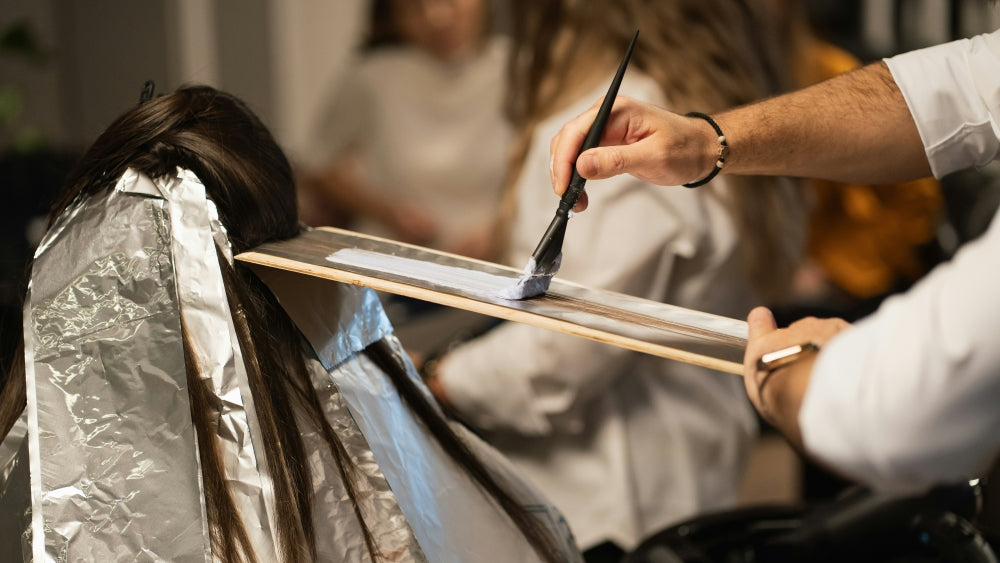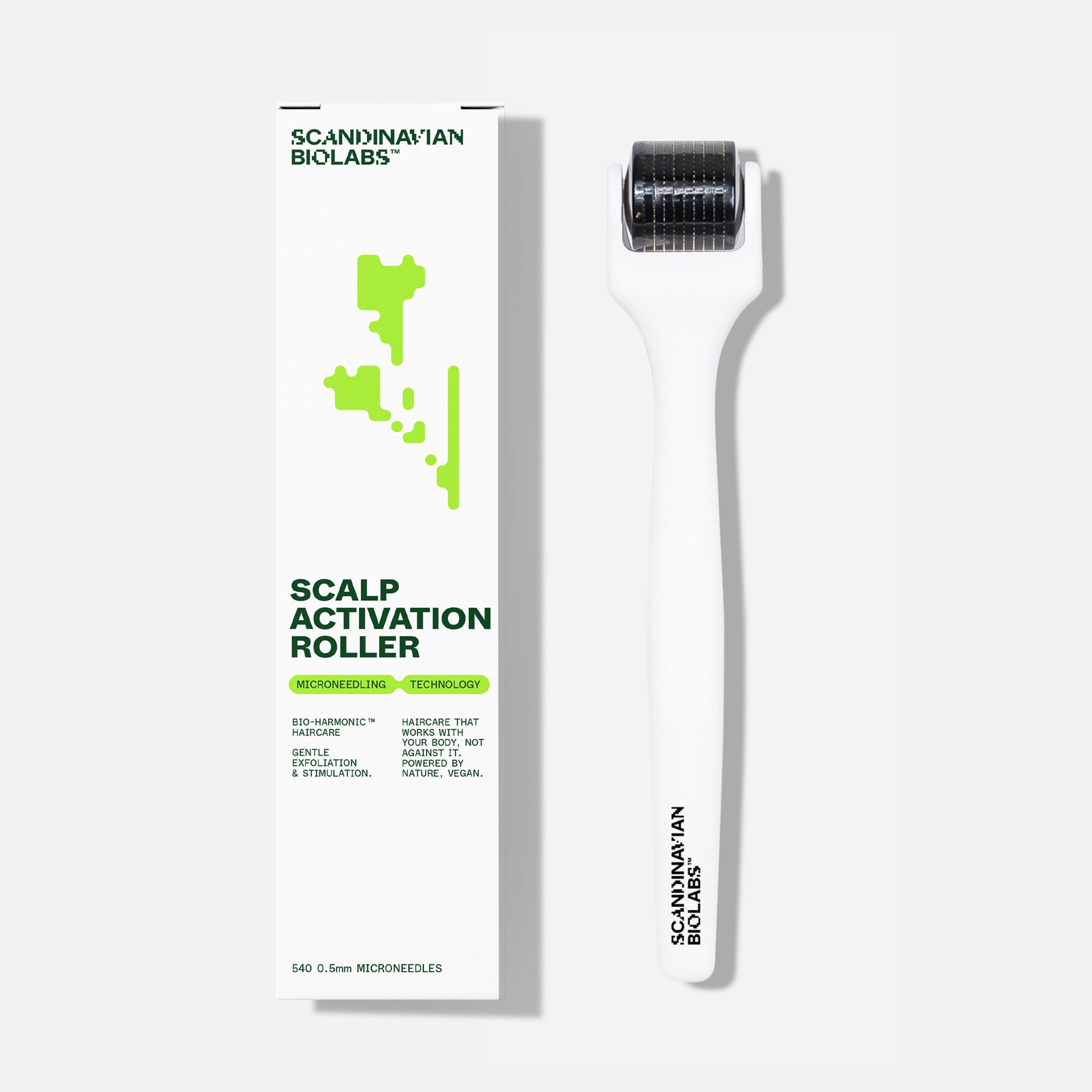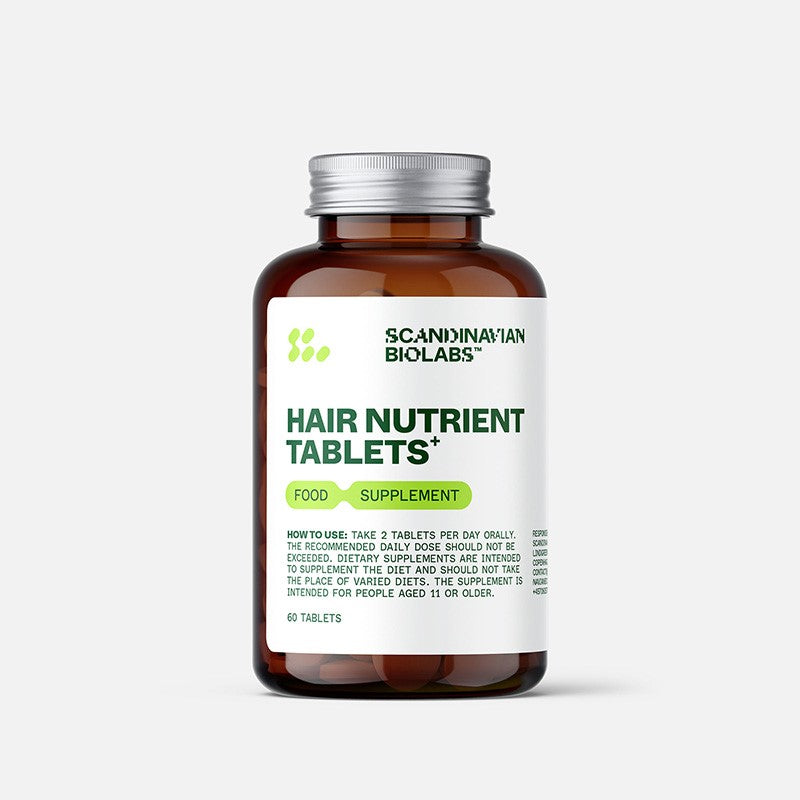Is your hair stuck in a stubborn growth rut? Your hair does not grow past a certain length, no matter how much time passes?
You watch people around you grow out their hair, but your hair just decides to lay back and do nothing? Not anymore.
Learn exactly how to fix stunted hair growth with these 10 science-backed, dermatologist-recommended methods.
Table of content
How does hair grow?

Hair growth goes through three phases: anagen (growth), catagen (transition), and telogen (resting). Most hairs (85% on your head) are in the anagen phase, which can last for years. Catagen is a short transition phase where growth slows down. Finally, the telogen phase is a resting phase that lasts a few months, after which the existing hair falls out and a new one starts growing in its place.
As your leading source for hair health information over the past 4 years, we never compromise on accuracy. When it comes to your health, you deserve information you can truly rely on - and earning your trust is our top priority.
Here's how Scandinavian Biolabs ensures every piece of content meets the highest standards of accuracy and integrity:
- Credentialed Experts: Our reviewers are actively practicing doctors and medical researchers
- Stringent Reviews: Content undergoes rigorous editing by subject specialists and review by a practicing doctor.
- Evidence-Based: We rely on well-established research from trusted scientific sources like peer-reviewed journals and health authorities.
- Full Transparency: Our editorial standards, writer credentials, reviewer credentials, correction process, and funding are all publicly documented.
- Independent Voice: While we do promote products, we operate in a vacuum to business operations. Our main goal is just an unwavering commitment to providing medically-sound guidance.
You can count on Scandinavian Biolabs to consistently deliver the trustworthy health information you deserve. Read our Editorial Standards.
What causes stunted hair growth?
Nutritional deficiencies, hormonal imbalances, genetic factors, medical conditions like thyroid disorders or autoimmune diseases, medications, excessive styling, and chronic stress or emotional distress can cause stunted hair growth, also known as hair stagnation.
Here's a detailed breakdown of the most common reasons why:
Genetics
Genetics can influence hair growth by determining your sensitivity to DHT (dihydrotestosterone). This hormone shrinks hair follicles over time, shortening the growth phase and leading to finer, shorter hair.
Age

As we age, hair follicles slow down production. This means hair grows at a slower pace and may become finer, leading to less overall growth and a thinner appearance.
Underactive thyroid
An underactive thyroid (hypothyroidism) slows hair regrowth by disrupting the hair follicle's natural cycle. Thyroid hormones influence the growth phase (anagen), and low levels can shorten this phase, leading to shorter hair and increased shedding. This is called thyroid hair loss.
Diet
Diet can hinder growth by lacking essential nutrients for healthy hair follicles. Deficiencies in protein, iron, zinc, and certain vitamins can cause hair loss and stunted hair growth.
Stress
Stress can push hair follicles into a prolonged resting phase, stalling new hair growth and causing hair loss. This is due to the stress hormone cortisol, which can redirect the body's resources away from hair growth and towards dealing with the stressor.
Medications
Hair growth can also be stunted by these medications:
- Chemotherapy drugs: These are notorious for causing anagen effluvium hair loss due to their targeting of rapidly dividing cells.
- Retinoids: Acne medications like isotretinoin (Accutane) can disrupt the hair growth cycle and lead to telogen effluvium.
- Antifungal medications: Fluconazole (Diflucan) and voriconazole (Vfend) are sometimes linked to hair loss.
- Antidepressants and mood stabilizers: Valproic acid (Depakote) and lithium (Lithobid) are examples that may cause hair thinning.
- Beta-blockers: Used for high blood pressure, these medications (propranolol, atenolol) can contribute to hair loss in some individuals.
Hairstyling practices

Styling your hair wrong can damage your hair and scalp.
Hair extensions and tight hairstyles like braids or ponytails can cause breakage, making hair appear shorter. This is called traction alopecia.
Heat styling tools like hair dryers, curlers, etc. The use of heat overall is not recommended.
Poor-quality hair care products can do more harm than good. Harsh chemicals can strip your hair of its natural oils, leaving it brittle and prone to damage. Hair oil is crucial for hair to look and feel strong.
Why is your hair stopped growing in one spot?
You might have stunted hair growth in one specific spot on your head for a couple of reasons. Here are the two most common culprits:
Alopecia areata
This is an autoimmune disease that causes patchy hair loss. It can affect any part of the body with hair, including the scalp, eyebrows, and beard. The patches of hair loss can be round or oval, and they may be completely smooth or have some very short, fine hairs [Mayo Clinic, Alopecia Areata].
Traction alopecia
This type of hair loss is caused by pulling or tension on the hair. It's common in people who wear tight hairstyles, such as braids, cornrows, or ponytails for extended periods [American Academy of Dermatology, Traction Alopecia].
How do you know if your hair growth is stunted?
To see if your hair stopped growing or not, here are a few pointers:
- Slow growth: This is the most common sign. If your hair seems to be taking much longer than usual to reach a certain length, it could be an indicator. Everyone's hair grows at a different rate, but a general rule of thumb is around half an inch per month. If you feel like you're nowhere near that after a few months, it might be worth investigating.
- Increased shedding: Notice more hair than usual coming out in the shower, on your brush, or throughout the day? While some shedding is normal (around 50-100 hairs a day), a significant increase could be a sign your hair growth cycle is disrupted.
- Hair thinning: Are your ponytails looking noticeably less voluminous? Is your scalp more visible than usual, particularly when you part your hair? This could be a sign of hair loss alongside stunted hair growth.
- Hair health: Pay attention to the general condition of your hair. Is it dry, brittle, or easily breaking? Stunted hair growth can often manifest as weak hair that struggles to retain length.
These might be the cause, but it's not always guaranteed. If you're concerned about your breakage and stunted growth (especially if it's accompanied by other symptoms like sudden hair loss, irritation, or redness), consult a dermatologist or health professional immediately.
How to fix stunted hair growth at home?
Here are the 10 best methods to promote hair growth and fix stunted hair growth:
Shampoo the correct way

Hair growth shampoos target several factors that could be hindering your hair's potential.
Hair growth shampoos include ingredients like biotin and vitamins to nourish the hair follicle, promoting a healthy environment for growth.
Other shampoos might contain caffeine to stimulate blood circulation in the scalp, bringing more nutrients to the follicles.
They might also focus on removing build-up that can clog pores and hinder growth.
It's important to remember that these shampoos won't magically accelerate growth, but rather create optimal conditions for your hair to reach its natural growth potential.
Use Hair Mask

Hair masks or similar hair products can create an environment that supports the rate at which your hair grows. By adding moisture and nutrients, hair masks can strengthen hair strands, reducing breakage that can make hair appear short.
This lets your hair reach its full growth potential. Look for masks with ingredients like coconut oil, castor oil, or shea butter for moisture, and keratin or argan oil for strengthening.
However, if you suspect stunted hair growth due to factors like diet, stress, or underlying health issues, address those alongside a hair care routine that includes masks.
Derma Rolling

Derma rolling creates tiny injuries on the scalp, triggering the body's healing process. This may stimulate blood flow and encourage hair follicles to grow thicker, healthier hair. It's most effective when combined with hair loss treatments like Minoxidil or minoxidil alternatives.
However, results can vary and research is ongoing. The outlook is that derma roller for hair growth are very promising.
Supplements

Supplements can address underlying nutrient deficiencies that might lead to hair loss and prevent your hair from growing. Biotin, for example, is a B vitamin that helps your body produce keratin, the main protein in hair. Vitamin D also plays a role in hair follicle health.
If you're deficient in these nutrients, a supplement could nourish your hair and promote growth. However, it's important to remember that supplements typically work best when combined with a balanced diet. They can't replace essential nutrients you should be getting from food.
Scalp Massage
Scalp massage might be a helpful tool to stimulate hair growth at home. The idea is that massaging increases blood flow to your scalp, bringing more oxygen and nutrients to the hair follicles.
This can potentially stimulate the follicles and encourage hair growth, especially in cases where poor circulation is contributing to stunted hair. While research isn't conclusive, it's a safe and easy method to try to improve hair health and growth.
You can massage your scalp daily for a few minutes using your fingertips or a scalp massager. Remember, consistency is key, so aim to make it a regular part of your hair care routine.
Healthy Diet
A healthy diet can provide the building blocks to strengthen the hair shaft and help with hair growth. Hair is mostly made of protein, so including lean meats, fish, eggs, beans, and nuts in your meals is important.
Biotin, found in these foods and some fruits, helps your body produce keratin, another key hair protein. Healthy fats from sources like avocado and salmon provide moisture and scalp health.
While there's no magical "hair growth food," a balanced diet rich in these nutrients can definitely support healthier, stronger hair that's less prone to breakage and grows your hair faster.
Reduce Stress
Stress can push hair follicles into a resting phase, slowing growth. By reducing stress, you create a more favorable environment for hair growth. Here's how managing stress at home can help:
- Improved blood flow: Stress reduction techniques like meditation and deep breathing can improve circulation, bringing more nutrients to your scalp and hair follicles.
- Hormonal balance: Chronic stress disrupts hormones that can impact hair growth. Stress management helps regulate these hormones, promoting a growth cycle.
- Better sleep: Stress can disrupt sleep, another factor in the health of your hair. Relaxation techniques can improve sleep quality - essential for healthy hair growth.
Manage Underlying Conditions
Many underlying conditions can affect hair growth by disrupting the hair follicle's normal cycle or nutrient supply. By managing these conditions, you can improve the environment for hair growth.
For example, proper thyroid function is crucial for hair growth. If an underactive thyroid is causing stunted hair, getting it treated can allow hair follicles to function normally again.
While managing underlying conditions won't necessarily guarantee your hair will grow faster, it can create a better environment for faster hair growth and potentially reverse stunted hair growth.
Trim Your Hair Regularly
While trimming itself doesn't directly accelerate hair growth, it can significantly help hair appear longer and healthier, which can be especially beneficial for those struggling with stunted hair growth.
Regular trims remove split ends, which can travel up the hair shaft and cause breakage. This breakage makes hair look shorter and prevents it from reaching its full potential.
By stopping split ends in their tracks, trims allow hair to grow out without breaking off, giving the illusion of faster growth.
Maintain Hydration
Proper hydration is crucial for growth. Hair is mostly protein, and water helps transport nutrients to the hair follicle, the root that produces hair.
Dehydration can hinder this process, leading to slower growth and potentially brittle hair. While staying hydrated alone won't necessarily make your hair grow faster than its natural rate, it can help it reach its full growth potential and appear healthier.
How to fix stunted hair growth medically?

There are a few ways to address stunted hair growth medically, depending on the cause. Here are the main ones:
- Minoxidil: This topical medication is a vasodilator, meaning it increases blood flow to the scalp, which can stimulate hair growth. If you are experiencing female pattern hair loss, this is what you should use to grow hair.
- Finasteride (men only): This medication blocks DHT, a hormone that can contribute to hair loss in men.
- Nutritional deficiencies: Inadequate protein, iron, or vitamins can impact hair growth. A doctor can check your levels and recommend supplements if needed.
- Underlying conditions: Hair loss can be a symptom of thyroid issues, scalp conditions, or autoimmune diseases. Addressing the underlying issue can help hair growth return to normal.
The medications for hair may require continuous use to see hair growth results. If you want long-lasting hair growth, it's important to target the underlying cause why your hair isn't growing.
Preventing stunted hair growth

There are a number of things you can do to prevent stunted hair growth. Here are some key ways to take care of your hair:
- Scalp health: A healthy scalp is a foundation for growth. Regularly cleanse your scalp to remove dirt and product buildup that may lead to breakage. Scalp massages can also improve blood circulation, which may benefit hair growth.
- Diet: Ensure you're getting enough essential nutrients for hair growth, including protein, iron, and omega-3 fatty acids. Consider incorporating fish, nuts, eggs, and leafy greens into your diet.
- Hair care practices: Limit heat styling tools and harsh chemicals that can damage hair. Be gentle when brushing or combing your hair, especially when it's wet. Regular trims can also help prevent split ends from traveling up the hair shaft and causing breakage.
- Supplements: Consider consulting a dermatologist or trichologist (a hair loss specialist) about hair growth supplements. Some studies suggest that fish oil or biotin supplements may be beneficial.
- Deep conditioning: Treat your hair to deep conditioning treatments once a week to replenish moisture, retain natural oils, and prevent breakage.
- Scalp masks: Look for scalp masks that can help exfoliate and remove dead skin cells, promoting a healthy scalp environment.
- Stress management: Chronic stress can contribute to hair loss. Relaxation techniques like yoga or meditation may be helpful.
When should you visit a doctor?
You should visit a doctor for stunted hair growth if you're experiencing any of the following:
- Sudden or patchy hair loss
- Scalp redness, itching, or scaling
- Hair loss that is accompanied by pain
- Significant hair loss (more than usual)
- Hair loss that is interfering with your quality of life
These could be signs of an underlying medical condition that needs treatment.
Conclusion
Don't feel like your natural hair growth is forever stunted! By understanding why your hair won't grow and incorporating these tips into your routine, you can encourage healthier growth and keep your hair long. Remember, consistency is key. Be patient with your hair and celebrate the progress you see along the way.
If you feel like your hair is losing suddenly in patches, scalp irritation, or excessive shedding, consult a doctor. They can also provide personalized advice to address your specific hair growth concerns.
- Promote healthy hair growth: A healthy scalp is the foundation for growth. Wash your hair regularly to remove dirt and product buildup that can lead to breakage. Scalp massages may also improve blood circulation, which can benefit hair growth.
- Nourish Your Hair: Ensure you're getting enough essential nutrients for hair growth in your diet, including protein, iron, and omega-3 fatty acids. Consider incorporating fish, nuts, eggs, and leafy greens.
- Gentle Hair Care Routine: Limit heat styling tools and harsh chemicals that can damage your hair. Be gentle when brushing or combing your hair, especially when it's wet. Regular trims can also help prevent split ends from traveling up the hair shaft and causing breakage.
- Deep Conditioning: Deep condition your hair once a week to replenish moisture, retain your hair's natural oils, and prevent breakage.
- Scalp Masks: Look for scalp masks that can help exfoliate and remove dead skin cells, promoting a healthy scalp environment.
- Stress Management: Chronic stress can contribute to hair loss. Relaxation techniques like yoga or meditation may be helpful.
FAQs
What nutritional deficiencies are most commonly associated with stunted hair growth?
The most common nutritional deficiencies associated with stunted hair growth are:
- Protein deficiency
- Iron deficiency
- Zinc deficiency
- Vitamin B7 (biotin) deficiency
- Vitamin A deficiency
- Vitamin C deficiency
How long does it typically take to see results from the recommended treatments for stunted hair growth?
Most people will need at least 4-6 months of consistent use of hair growth methods like supplements, massages, dietary changes, etc. to notice a visible difference in hair length or thickness. Faster results may occur with medical treatments like minoxidil. Patience is key as growth takes time.
What types of scalp masks can help promote hair growth?
Scalp masks containing ingredients like peppermint oil, tea tree oil, rosemary oil, and eucalyptus oil can help promote circulation and a healthy scalp environment. Keratin, biotin, and argan oil are also good ingredients to look for in hair growth masks.
How to fix stunted 4C hair?
For healthy 4C growth, deep condition weekly to replenish moisture. Moisturize with water-based products, then seal with oils or butters. Minimize heat styling and opt for braids or bantu knots for length. Trim split ends to prevent breakage. This routine will nourish your hair and help it thrive!
Does haircut stunt cause stunted hair growth?
Haircuts actually don't stunt hair growth! It's a common misconception. Hair grows from the root, and cutting the ends doesn't affect that process. You might feel it's growing faster after a trim because short hair shows new growth more noticeably.
Read more:
- Topical Finasteride Side Effects: What You Need to Know Before Starting
- Vitamins for Hair Loss: Essential Nutrients for Stronger, Healthier Hair
- Yeast Infection on Scalp: Symptoms, Causes, and Effective Treatments










